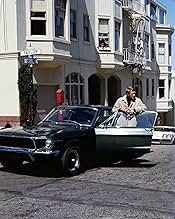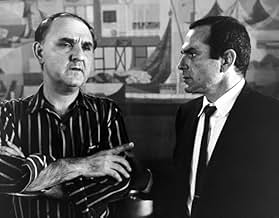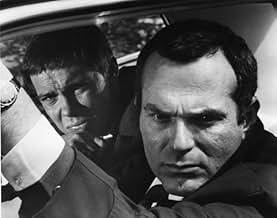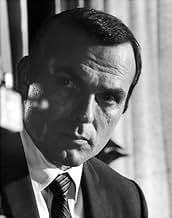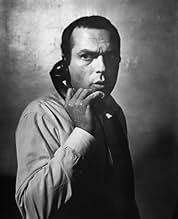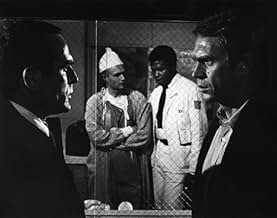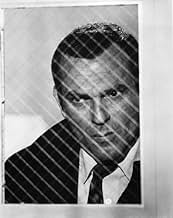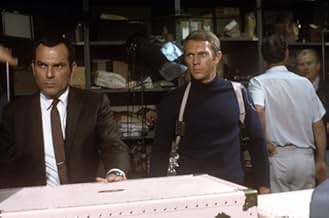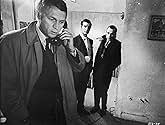Un poliziotto di San Francisco indaga per scoprire il responsabile dell'omicidio di un testimone che era stato incaricato di proteggere.Un poliziotto di San Francisco indaga per scoprire il responsabile dell'omicidio di un testimone che era stato incaricato di proteggere.Un poliziotto di San Francisco indaga per scoprire il responsabile dell'omicidio di un testimone che era stato incaricato di proteggere.
- Regia
- Sceneggiatura
- Star
- Vincitore di 1 Oscar
- 7 vittorie e 9 candidature totali
Vic Tayback
- Pete Ross
- (as Victor Tayback)
Recensioni in evidenza
This movie is a great example of how style can prevail over substance in a film. The story is straight-forward enough, but nothing outstanding - Det. Bullitt is assigned to protect a witness who will testify against the mob. He must protect him for about 40 hours, but somehow, hitmen discover the location of the witness and gun him down before he can testify. Then Bullitt must find the hitmen, as well as deal with an identity twist concerning the witness.
However, the music score, tight direction, the car chase, McQueen's performance, and especially Robert Vaughn's performance as a ruthless politician make "Bullitt" worth watching. In fact the performances are excellent all the way through the cast (with the exception of Jacqueline Bisset, who's there only for eye candy and brings nothing special to her role).
Of course, the car chase is the most famous aspect of the film. Simply put, it's the best car chase ever filmed, bar none. It's been copied, and with today's technology, should have been exceeded. Yet it still stands alone. Why?
First, the presence of Steve McQueen - who else could bring it off as well as he did? Second, the era it came from, the late 60's. Films in those days didn't have chases, so it set the standard. There's no camera tricks or special effects to screw it up, what you see is what you get. It's just wouldn't be the same if one of today's big stars got in his BMW to chase another guy in a Porsche, complete with special effects, the obligatory explosions and slow-motion techniques.
If you've never seen it, watch it. If you have seen it, it still holds up after repeated viewings. 9 out of 10.
However, the music score, tight direction, the car chase, McQueen's performance, and especially Robert Vaughn's performance as a ruthless politician make "Bullitt" worth watching. In fact the performances are excellent all the way through the cast (with the exception of Jacqueline Bisset, who's there only for eye candy and brings nothing special to her role).
Of course, the car chase is the most famous aspect of the film. Simply put, it's the best car chase ever filmed, bar none. It's been copied, and with today's technology, should have been exceeded. Yet it still stands alone. Why?
First, the presence of Steve McQueen - who else could bring it off as well as he did? Second, the era it came from, the late 60's. Films in those days didn't have chases, so it set the standard. There's no camera tricks or special effects to screw it up, what you see is what you get. It's just wouldn't be the same if one of today's big stars got in his BMW to chase another guy in a Porsche, complete with special effects, the obligatory explosions and slow-motion techniques.
If you've never seen it, watch it. If you have seen it, it still holds up after repeated viewings. 9 out of 10.
Steve McQueen is Frank Bullitt! Frank Bullitt is slick! 'Bullitt' is thrilling! The stylish mystery thriller that created a basis for all future police procedurals to follow! With fantastic direction from Peter Yates and immaculate attention to detail on the stunning cinematography, 'Bullitt' is an attention-demanding and action-packed adventure supported by a jazz-fuelled score. When reviewing this crime flick, who could overlook the unforgettable Mustang v Charger chase through the streets of San Francisco which is arguably the greatest and most influential car chase ever filmed. 'Bullitt' is a dark and suspenseful masterpiece from Peter Yates.
The first lone-wolf cop story plays by the rules of the genre it spawned, featuring a charismatic, outsider type who carries a badge and an attitude directed just as much against the egos and hubris of his superiors as against the criminal element.
Frank Bullitt (Steve McQueen) is a detective lieutenant on the San Francisco police force who gets handed a "babysitting job" looking after a would-be Mob informant by ambitious politico Chalmers (Robert Vaughn). Things go wrong with an attempted hit that leaves the informant and his guard in intensive care and Bullitt on the wrong side of Chalmers, not to mention a pair of killer hoods who tool around in a Dodge Charger and have no respect either for stop signs or Mustangs.
"Bullitt" the movie is best-known for an automotive duel between the assassin duo and Bullitt, still championed by some as the greatest car chase in movie history. I think it's been lapped myself, though I admire the long sections of real-time churn-and-burn since it flies in the face of MTV-style fast cutting we know today. The hoods Bullitt chase look like insurance salesmen, but of course they were really stunt men, and with McQueen doing a good deal of his own stunt driving as well, there's a validity to the sequence that makes up for some slackness in the composition.
"Bullitt" is a better film for the things that occur around the car chase, not so much with the central mystery of Johnny Ross as with the scenes of Bullitt in his element, like making coffee, talking with his superiors, eating a sandwich. McQueen's acting was showcased better in films like "The Sand Pebbles," "The Cincinnati Kid," and even his final film "The Hunter," but his star power was never more in evidence than it was here, especially in the scenes he shares with Vaughn, who plays the role of a preppy hardass to perfection and gives both McQueen and the viewer a foil more evil than the real crooks in this picture.
Seeing Bullitt handle Chalmers' baiting is a real lesson in how less is more. There's a scene where a fingerprint check gives Bullitt the opportunity to let Chalmers have it, but instead of rounding on the jerk, he simply tells Chalmers the score as he makes for the door in one of the great underplayed lines ever filmed.
Verisimilitude is everything in "Bullitt," as director Peter Yates and screenwriters Alan Trustman and Harry Kleiner present it. Long scenes are shot in operating rooms, morgues, and hotel-room crime scenes as a way of presenting what we are seeing as real in a way no other film did then and few have done since. Every shot, as Yates explains on his DVD commentary, was shot on a real location, and you feel like he got it all down exactly right, getting the right mix of style and drab reality. A shot cop moans while blood pulses through his wound, while a strangled woman is seen in such gory detail we understand another character's need to throw up over it. Throughout there's Bullitt as only McQueen could play him, saying the right line the right way, jumping in an ambulance to fix a problem, telling his gorgeous girlfriend (Jacqueline Bisset) "It's not for you, baby" in a way that comes off utterly cool rather than gratingly sexist.
I couldn't figure out what was going on with the crooks "the Organization" as they are dubbed since calling them the Mafia was seen as demeaning to a particular ethnic group not yet known for creating films like "The Godfather" or "GoodFellas" not until I watched "Bullitt" a second time, at which point I realized that wasn't so important. "Bullitt" has an annoying subtext of police work as dehumanizing, something Bullitt understands implicitly makes him a tool for the wrong sort of people. That was the year that was 1968, Chicago and all that, but the au currant anti-establishment notes do rankle.
But McQueen was a cinematic great, one who doesn't get as much attention today but proves here why his image is so enduring. Yates credits the clothes McQueen wears, but Yates himself, along with his writers, Vaughn, Bissett, and a terrific supporting cast led by Simon Oakland as Bullitt's tough-but-fair captain, create one of the great platforms for a movie tough guy ever built, a platform McQueen fills very, very well.
Frank Bullitt (Steve McQueen) is a detective lieutenant on the San Francisco police force who gets handed a "babysitting job" looking after a would-be Mob informant by ambitious politico Chalmers (Robert Vaughn). Things go wrong with an attempted hit that leaves the informant and his guard in intensive care and Bullitt on the wrong side of Chalmers, not to mention a pair of killer hoods who tool around in a Dodge Charger and have no respect either for stop signs or Mustangs.
"Bullitt" the movie is best-known for an automotive duel between the assassin duo and Bullitt, still championed by some as the greatest car chase in movie history. I think it's been lapped myself, though I admire the long sections of real-time churn-and-burn since it flies in the face of MTV-style fast cutting we know today. The hoods Bullitt chase look like insurance salesmen, but of course they were really stunt men, and with McQueen doing a good deal of his own stunt driving as well, there's a validity to the sequence that makes up for some slackness in the composition.
"Bullitt" is a better film for the things that occur around the car chase, not so much with the central mystery of Johnny Ross as with the scenes of Bullitt in his element, like making coffee, talking with his superiors, eating a sandwich. McQueen's acting was showcased better in films like "The Sand Pebbles," "The Cincinnati Kid," and even his final film "The Hunter," but his star power was never more in evidence than it was here, especially in the scenes he shares with Vaughn, who plays the role of a preppy hardass to perfection and gives both McQueen and the viewer a foil more evil than the real crooks in this picture.
Seeing Bullitt handle Chalmers' baiting is a real lesson in how less is more. There's a scene where a fingerprint check gives Bullitt the opportunity to let Chalmers have it, but instead of rounding on the jerk, he simply tells Chalmers the score as he makes for the door in one of the great underplayed lines ever filmed.
Verisimilitude is everything in "Bullitt," as director Peter Yates and screenwriters Alan Trustman and Harry Kleiner present it. Long scenes are shot in operating rooms, morgues, and hotel-room crime scenes as a way of presenting what we are seeing as real in a way no other film did then and few have done since. Every shot, as Yates explains on his DVD commentary, was shot on a real location, and you feel like he got it all down exactly right, getting the right mix of style and drab reality. A shot cop moans while blood pulses through his wound, while a strangled woman is seen in such gory detail we understand another character's need to throw up over it. Throughout there's Bullitt as only McQueen could play him, saying the right line the right way, jumping in an ambulance to fix a problem, telling his gorgeous girlfriend (Jacqueline Bisset) "It's not for you, baby" in a way that comes off utterly cool rather than gratingly sexist.
I couldn't figure out what was going on with the crooks "the Organization" as they are dubbed since calling them the Mafia was seen as demeaning to a particular ethnic group not yet known for creating films like "The Godfather" or "GoodFellas" not until I watched "Bullitt" a second time, at which point I realized that wasn't so important. "Bullitt" has an annoying subtext of police work as dehumanizing, something Bullitt understands implicitly makes him a tool for the wrong sort of people. That was the year that was 1968, Chicago and all that, but the au currant anti-establishment notes do rankle.
But McQueen was a cinematic great, one who doesn't get as much attention today but proves here why his image is so enduring. Yates credits the clothes McQueen wears, but Yates himself, along with his writers, Vaughn, Bissett, and a terrific supporting cast led by Simon Oakland as Bullitt's tough-but-fair captain, create one of the great platforms for a movie tough guy ever built, a platform McQueen fills very, very well.
Despite having aged somewhat, Bullitt remains a tough, gritty, and altogether realistic portrait of police life in late sixties San Francisco. The film is of course most renowned for the spectacular (even by today's standards) car chase in which star Steve McQueen famously did his own stunt driving (I wonder what the insurance policy was like?!) Although McQueen didn't really have to stretch beyond his already established screen persona, he is perfect in the role. He is Bullitt like Connery is Bond. Maybe the role was tailored specifically for him. He also has Jacqueline Bisset (Cathy), who can more than hold her own with any Bond girl, to come home to! She adds a welcome domestic quality and the audience feels relieved that despite the unforgiving profession Bullitt works in, at least he has a good woman at his side. The location photography in beautiful San Francisco, the to-the-letter accurate procedural dialogue, the political infighting with the smarmy D.A. Chalmers (Robert Vaughn) and the brutally violent action scenes all complement the fine performances to create an entirely engrossing authentic crime drama. Watch for the great Robert Duvall in a minor role as the cabbie.
With the possibly exception of Casablanca, I think this must be the film I've watched on TCM more than any other. I mean, I feel like I must catch it every time it airs, not intentionally, but I turn on my TV, and there it is. It's gotten where not only do I know how every scene unfolds in order, but I also almost feel like I could write down the action shot by shot without looking. And even so, I'm still not sure I understand the plot after all these viewings! The mobsters and informants are almost meaningless. They're just there to give Steve McQueen someone to chase and shoot.
The real conflict of the movie is between McQueen's Bulitt and Robert Vaughn's Chalmers (is Superintendent Chalmers, or "Super Nintendo Chalmers" as Ralph Wiggum once called him, named after this character?). The whole movie appears to be a set-up for the one moment McQueen can say BS to Vaughn when he suggests compromise is sometimes okay. Anyway, I love the '60s vibe. I love Jacqueline Bissette wearing only pajama tops and apparently sleeping nude. I love the view of the street from her breakfast nook (looks just like the view from the apartment Benjamin rents in The Graduate). I love the flute-led jazz combo at the restaurant (they're probably somebody real and famous, at least within jazz circles, but I've never learned who).
The real conflict of the movie is between McQueen's Bulitt and Robert Vaughn's Chalmers (is Superintendent Chalmers, or "Super Nintendo Chalmers" as Ralph Wiggum once called him, named after this character?). The whole movie appears to be a set-up for the one moment McQueen can say BS to Vaughn when he suggests compromise is sometimes okay. Anyway, I love the '60s vibe. I love Jacqueline Bissette wearing only pajama tops and apparently sleeping nude. I love the view of the street from her breakfast nook (looks just like the view from the apartment Benjamin rents in The Graduate). I love the flute-led jazz combo at the restaurant (they're probably somebody real and famous, at least within jazz circles, but I've never learned who).
Lo sapevi?
- QuizWhile filming the scene where the giant airliner taxis just above Steve McQueen, observers were shocked that no double was used. Asked if the producers couldn't have found a dummy, McQueen wryly replied, "They did."
- BlooperDuring the chase sequence, the same green Volkswagen Beetle is seen at least 4 different times in 4 different locations in a period of not more than 1 minute.
- Versioni alternativeDuring the car chase, when the Charger goes wide on a corner and hits a camera, the film was salvaged and red frames added at the end, to give a "point of impact" impression. Despite this gag being in situ for decades, on the current Cinemax Asia print, someone has seen fit to completely remove these last frames of the shot.
- ConnessioniEdited into Città in fiamme (1979)
I più visti
Accedi per valutare e creare un elenco di titoli salvati per ottenere consigli personalizzati
- How long is Bullitt?Powered by Alexa
Dettagli
- Data di uscita
- Paese di origine
- Lingua
- Celebre anche come
- Đại Tá Bullitt
- Luoghi delle riprese
- Coffee Cantata, Union Street, San Francisco, California, Stati Uniti(jazz club and restaurant scene)
- Azienda produttrice
- Vedi altri crediti dell’azienda su IMDbPro
Botteghino
- Budget
- 5.500.000 USD (previsto)
- Lordo Stati Uniti e Canada
- 511.350 USD
- Fine settimana di apertura Stati Uniti e Canada
- 408.627 USD
- 7 ott 2018
- Lordo in tutto il mondo
- 512.162 USD
Contribuisci a questa pagina
Suggerisci una modifica o aggiungi i contenuti mancanti




